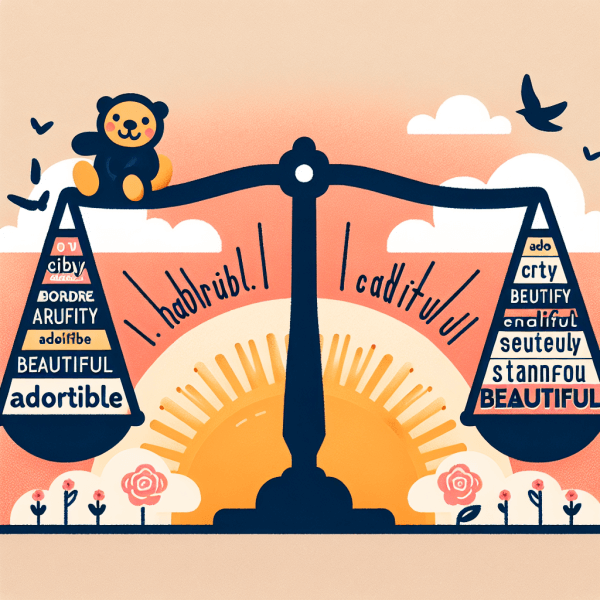The English language is rich with nuances that enable speakers to express a wide range of emotions and observations. Two adjectives that often appear in conversations about aesthetics, feelings, or impressions are 'beautiful' and 'adorable'. While they might seem similar, they convey distinct meanings and evoke different emotional responses. This essay delves into the differences between 'beautiful' and 'adorable', including their definitions, connotations, and usage in everyday language.
Definition and Connotation
'Beautiful' is an adjective primarily used to describe someone or something that possesses qualities that are pleasing to the senses or mind aesthetically. It is a broader term that can apply to a variety of subjects, including nature, art, people, and experiences. The connotation of 'beautiful' tends to be more formal and intense, often referring to a sense of elegance or grandiosity.
On the other hand, 'adorable' refers specifically to something that is charming or delightful, often invoking feelings of affection and warmth. This term is frequently used to describe pets, children, or anything that inspires a sense of cuteness. The connotation of 'adorable' is more intimate and informal, often associated with feelings of love or endearment.
Usage and Examples
When using the word 'beautiful', one might say:
"The sunset over the ocean was beautiful, painting the sky in hues of orange and purple."
In this example, 'beautiful' highlights the striking aesthetic qualities of a natural phenomenon, emphasizing its visual appeal.
Conversely, in a context where 'adorable' is more appropriate, one might say:
"The puppy wagged its tail and playfully bounded around the room; it was utterly adorable."
Here, 'adorable' signifies a sense of cuteness and charm that is heartwarming, focusing on the puppy’s playful behavior rather than a generalized beauty.

Situational Context
The choice between 'beautiful' and 'adorable' also depends on the situational context and the emotional undertones the speaker intends to convey. For instance:
- In discussing art, one might prefer 'beautiful' to convey the magnificence of a painting: "The artist created a beautiful masterpiece that captivates the viewer."
- In conversations about a child's first steps, one would likely use 'adorable': "Watching her take her first steps was the most adorable sight."
Conclusion
In summary, while 'beautiful' and 'adorable' may occasionally overlap in informal speech, their meanings diverge significantly based on context, audience, and intent. 'Beautiful' encompasses a broader and more formal sense of aesthetic pleasure, while 'adorable' conveys charm and tenderness in a more intimate and informal manner. Understanding these nuances allows for more precise and effective communication, enhancing the richness of the English language.








Have a discussion about this article with the community:
Report Comment
We're doing our best to make sure our content is useful, accurate and safe.
If by any chance you spot an inappropriate comment while navigating through our website please use this form to let us know, and we'll take care of it shortly.
Attachment
You need to be logged in to favorite.
Log In